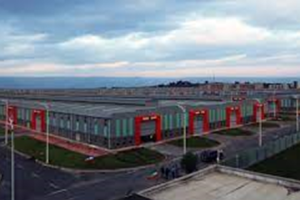
BY ABEBE WOLDEGIORGIS
During the imperial and the Derg era, corruption was not reached to the level as witnessed today. But no one can deny that various crimes were committed in those times by the governments. Criminal acts related with corruption, robbery and abusing authority did not reach to their pick level. Institutions established in the imperial and Derg era contributed a lot to contain corruption. The working system, legal frame works and structures played their part to mitigate corruption
. The institutions created awareness that all citizens to know that they have the duty to fight corruption and to cooperate with the government to that end. After the downfall of the Derg regime the procreator established to prosecute the regime officials for their crime against humanity but did not charge them on corruption. Starting from the Derg Chairman Mengistu Hilemariam, up to the lower ranking Derg members were not prosecuted for criminal act of corruption. During the Derg era corruption was not manifested as an existential threat for the nation. In the recent past, a study was conducted to establish ethics and anti -corruption commission and as to the study, corruption practice was not a worrisome that time.
Though the imperial and the Derg regimes were accused for violation of human right, they had not been leveled as culprit in corruption. Yohannes Woldegebreal is a lawyer working for various firms for the last 32 years. As to him, in both two past regimes, the government property and budget were properly managed and the officials who were appointed to the post were men of ethics.
The Derg did not abandon the imperial regime’s institutions, administrative laws and justice system so that it could contain the possible corruption plot. The investigation commission established in the last hours of the Prime Minister Aklilu Habtewold power tenure had sufficient capacity to investigate crimes and to gather evidence but it had not prosecuted the imperial officials by corruption.
In the Derg era, there was rumor that the imperial regime officials had committed corruption crime and the Derg pledged to investigate it but instead of taking appropriate measure based on evidence, it rather committed crime against humanity. It killed the imperial officials cold bloodedly and confiscated their properties illegally. Many shareholder companies were labeled as if they were owned by the emperor and had become nationalized. However, it was proved that the companies had been performing legally with due paying taxes.
They had been audited annually with no delay and their income and expenditure had been properly announced to the pertinent government body. They also had been established legally. Historically and culturally trading profession had been disregarded and still socially marginalized. The involvement of the emperor in shareholders’ business had been a disgrace for him. Even some secretes of the emperor’s share were displayed by the Derg in order to defame him. Nevertheless, no evidence was found that explained the involvement of the emperor and his officials in money embezzlement.
The accusation of the emperor as if he had been linked in illegal business was baseless. The investigation commission served for two years and exposed some criminal acts committed in the imperial era through media. It investigated high officials of the emperor. However, its ultimate findings were related with the famine which took the life of hundreds of thousands of people in Wollo province in 1973. He prosecuted them by blaming that they had been responsible for the created human disaster.
According to the then criminal law, crime committed by letting people to be starved would punish the culprit from 3 to 10 years imprisonment. The prosecution charge was sent to the special military tribunal court but the Derg illegally took the file and punished 60 imperial officials by death. Later on investigative committee had been banned by new proclamation. As to Yohannes, in the Derg era, there were many institutions established to investigate corruption related crimes with the mandate to prosecute.
The Derg special investigative team and central investigation bureau also can be mentioned here. In 1988 it also established the workers supervision committee and these all had worked on anti- corruption struggle. The other strong institution established with full power was the special procreator office in 1996.
These institutions can be said that they played their own role to raise the society awareness about the negative consequence of corruption on the nation’s socio-economic growth. As to Yohannes, following the downfall of the Derg regime, an institution was established in 1998 during the EPRDF era, by considering corruption as a threat to the norms of the society and economic well-being.
In addition, National Greif Hearing Committee was established. But the established anti- corruption commission did not live up to its mission and served only to advance the ruling party political interest by revenging its political rivals. Most of the prosecuted officials were part of the Derg establishment and expelled from their office and labeled by false accusation of possessing illegal property. At the end of 2000 special prosecutor office was established and the major task of the office was investigating corruption acts committed during the Derg era. It lasted for 15 years and was ceased to exist.
Later other institution by its name “corruption investigating team” under the auspicious of the Ministry of Justice was established in 2001 and investigated the corruption committed by the former Prime Minister Tamrat Layne now in exile in the USA. After the split of TPLF in 2009, the Federal Ethics and Anti –Corruption Commission was established. In the very beginning that time, the society regarded the commission as political weapon to attack political opponents.
The enacting of the anticorruption law to prosecute Siye Abraha, the former official of TPLF can be mentioned as the case in point. Latter in order to fight corruption and abuse of power for personal gains, ombudsmen was established but as many agreed, it did not bring a difference in halting corruption or protecting citizens from grievance committed by political authorities. Before the coming to power of Abiy Ahmed in 2016, the authority given to the anticorruption commission to prosecute people suspected of corruption was revoked by the parliament and now it only engaged in inculcating citizens to be ethical and loyal to their country.
The legislative took such measure by reasoning that if the commission continues with its prosecuting power it may become an authoritative entity. There are many questions to be raised regarding the commission’s carrier. Some ask what did the commission do since its establishment in 2000, did it obtain respect from the public, did the commissioners who were appointed to lead the commission became a model to the society as a hero of anti –corruption campaign, did the government become credible to the public because of the commission’s activities and so on. As to Yohannes Woldegebriel, recently, new anti-corruption task force is established at the national level which has seven members.
The structure of the committee seems better because the members are from different organizations with various professional backgrounds. The task force has members with investigating and prosecuting back ground. It comprised the Minister of National Security, Minister of Justice and high officials of the government. But the jurisdiction of the task force is not known. The structure is wonderful but whether it fulfills its mission or not, time tells.
According to him, currently, corruption in Ethiopia is not an ordinary crime; it has been a worrisome phenomenon. It has been a challenge for the nation’s existence and its continuity. Particularly in the past four years,
the situation has been aggravating and unless remedial action is quickly taken as a society, future of the country will be unpredictable. Unless corruption, characterized as a cancer of the economy, is wiped-out effectively, it would have adverse impact on the economic activities of the country. Investors, local or foreign, could lose confidence on the nation’s business process and may be abstained from investing in the country or pushed to cease their already operational firm. This and other spoiled effects of corruption make intensifying the struggle against corruption mandatory, it was learned.
The Ethiopian Herald January 12/2023





